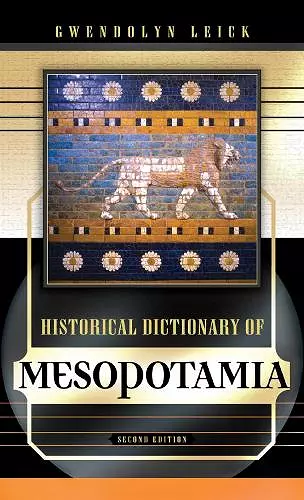Historical Dictionary of Mesopotamia
Format:Hardback
Publisher:Scarecrow Press
Published:16th Nov '09
Currently unavailable, and unfortunately no date known when it will be back

The Greek name Mesopotamia means "land between the rivers." The Romans used this term for an area that they controlled only briefly (between 115 and 117 A.D.): the land between the Euphrates and Tigris rivers, from the south Anatolian mountains ranges to the Persian Gulf. It comprises the civilizations of Sumer and Akkad (third millennium B.C.) as well as the later Babylonian and Assyrian empires of the second and first millennium. Although the "history" of Mesopotamia in the strict sense of the term only begins with the inscriptions of Sumerian rulers around the 27th century B.C., the foundations for Mesopotamian civilization, especially the beginnings of irrigation and the emergence of large permanent settlements, were laid much earlier, in the fifth and fourth millennium. The second edition of the Historical Dictionary of Mesopotamia defines concepts, customs, and notions peculiar to the civilization of ancient Mesopotamia, from adult adoption to ziggurats. This is accomplished through a chronology, an introductory essay, a bibliography, appendixes, and hundreds of cross-reference dictionary entries on religion, economy, society, geography, and important kings and rulers.
In this update to the 2003 edition, author Leick delves into one of the world?s most ancient civilizations, the ?land between the rivers,? Mesopotamia. The work begins with a quick chronology and a lucid introduction that briefly acquaints the reader withthe geography, history, and culture of Mesopotamia. The A?Z entries cover topics of a general nature (Agriculture, Building inscriptions, Languages, Warfare, Women) as well as more specific places and personages (Babylon, Cyrus II the Great, Herodotus, Ur). Other entries highlight art, archaeological finds, religious beliefs, and political structures. Included in the appendixes is a chronological list of rulers of Mesopotamia from circa 2650 BCE up to the Parthians (129?58 BCE), the bane of the Roman Empire. Also included is a list of museums around the world with notable collections of Mesopotamian artifacts. As with most of Scarecrow?s Historical Dictionaries, the most impressive feature for research is the expansive, categorized select bibliography. In 54 pages of secondary articles and monographs, readers are presented with further readings on daily life, geography, trade, and other topics. This Historical Dictionary is highly recommended for any academic or large public library looking to update or * Booklist, May 2010 *
Overall, this is indeed a valuable resource. * American Reference Books Annual *
In this update to the 2003 edition, author Leick delves into one of the world’s most ancient civilizations, the “land between the rivers,” Mesopotamia. The work begins with a quick chronology and a lucid introduction that briefly acquaints the reader with the geography, history, and culture of Mesopotamia. The A–Z entries cover topics of a general nature (Agriculture, Building inscriptions, Languages, Warfare, Women) as well as more specific places and personages (Babylon, Cyrus II the Great, Herodotus, Ur). Other entries highlight art, archaeological finds, religious beliefs, and political structures. Included in the appendixes is a chronological list of rulers of Mesopotamia from circa 2650 BCE up to the Parthians (129–58 BCE), the bane of the Roman Empire. Also included is a list of museums around the world with notable collections of Mesopotamian artifacts. As with most of Scarecrow’s Historical Dictionaries, the most impressive feature for research is the expansive, categorized select bibliography. In 54 pages of secondary articles and monographs, readers are presented with further readings on daily life, geography, trade, and other topics. This Historical Dictionary is highly recommended for any academic or large public library looking to update or develop a dynamic ancient history collection. * Booklist, May 2010 *
ISBN: 9780810861824
Dimensions: 228mm x 148mm x 23mm
Weight: 517g
302 pages
Second Edition